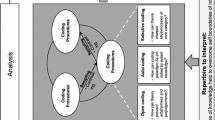Abstract
Qualitative empirical research and case studies have, like any other scientific method, their strengths and weaknesses. But how valid are the findings stemming from such research, particularly when they are base on data gained from interviews? This paper primarily deals with the methodological problems throughout the whole research process. Areas of concerns are: (1) before collecting data and during the whole research process, (2) the process of collecting data, (3) internal validity and making sense of data, (4) external validity of the data and findings, (5) relation between the findings and social sciences as well as social practice. The analysis will reveal a mixed picture concerning the scientific value of qualitative case studies. There is some good news. There is more methodological freedom and room for creativity in qualitative research than it seems at first glance. On the other hand there is a need for a greater methodological awareness particularly concerning possible downsides of subjectivity, the generalisation of the findings, conscious and unconscious biases, influences of dominant ideologies and mainstream thinking. Above all, there is a great need for rational critique. There is great need for a more critical attitude towards (basic) assumptions—particularly, to challenge, question and criticise literally everything systematically and permanently and to put the findings sufficiently in relation to the wider historical context, i.e. epochal ideologies and societal structures. Social science research has to contribute much more to the discussion of values, interests, and ideologies that shape current and future social practices.
Similar content being viewed by others
References
Achenbaum A.A. (2001). When good research goes bad. Mark. Res. 13(4): 13–15
Altheide D.L. and Johnson J.M. (1998). Criteria for assessing interpretative validity in qualitative research. In: Denzin, N.K. and Lincoln, Y.S. (eds) Collecting and Interpreting Qualitative Materials, pp 283–312. Sage, Thousand Oaks
Alvesson M. (2003). Methodology for close up studies—struggling with closeness and closure. Higher Educ. 46(2): 167–193
Anastas J.W. (2004). Quality in qualitative evaluation: issues and possible answers. Res. Soc. Work Pract. 14(1): 57–65
Angen M.J. (2000). Evaluating interpretive inquiry: reviewing the validity debate and opening the dialogue. Qual. Health Res. 10(3): 378–395
Barbour R.S. (2003). The newfound credibility of qualitative research? Tales of technical essentialism and co-option. Qual. Health Res. 13(7): 1019–1027
Blichfeldt B.S. and Andersen J.R. (2006). Creating a wider audience for action research: learning from case-study research. J. Res. Pract. 2(1): 1–15
Bryman A. (2006). Paradigm peace and the implications for quality. Int. J. Soc. Res. Methodol. 9(2): 111–126
Caelli, K., Ray, L., Mill, J.: ‘Clear as mud’: Toward greater clarity in generic qualitative research. Int. J. Qual. Methods 2(2), Article 1, retrieved September 2, 2004 from http://www.ualberta.ca/~iiqm/backissues/pdf/caellietal.pdf (2003)
Collins E.C. (1992). Qualitative research as art: toward a holistic process. Theory into Pract. XXXI(2): 181–185
Deem R. (2001). Globalisation, new managerialism, academic capitalism and entrepreneurialism in universities: is the local dimension still important? Comp. Educ. 37(1): 7–20
Denzin N.K. (1998). The art and politics of interpretation. In: Denzin, N.K. and Lincoln, Y.S. (eds) Collecting and Interpreting Qualitative Materials, pp 313–344. Sage, Thousand Oaks
Diefenbach T. (2003). Kritik und Neukonzeption der Allgemeinen Betriebswirtschaftslehre auf sozialwissenschaftlicher Basis. Gabler Verlag, Wiesbaden
Diefenbach T. (2007). The managerialistic ideology of organisational change management. J. Organ. Change Manage. 20(1): 126–144
Drisko, J.W.: Strengthening qualitative studies and reports: Standards to promote academic integrity. J. Soc. Work Educ. 33(1), retrieved September 2, 2004 from EBSCO, item 9703102481 (1997)
Easterby-Smith M., Thorpe R. and Lowe A. (1991). Management Research. An Introduction. SAGE Publications, London
Eden C. and Huxham C. (1996). Action research for management research. Br. J. Manage. 7: 75–86
Fine G.A. (1993). Ten lies of ethnography: moral dilemmas of field research. J. Contemp. Ethnogr. 22: 267–294
Glaser B.G. and Strauss A.L. (1967). The Discovery of Grounded Theory—Strategies for Qualitative Research. de Gruyter, Hawthorne
Henwood K. and Pidgeon N. (1994). Beyond the qualitative paradigm: a framework for introducing diversity within qualitative psychology. J. Community Appl. Soc. Psychol. 4: 225–238
Jensen J.L. and Rodgers R. (2001). Cumulating the intellectual gold of case study research. Public Adm. Rev. 61(2): 235–246
Karami A., Rowley J. and Analoui F. (2006). Research and knowledge building in management studies: an analysis of methodological preferences. Int. J. Manage. 23(1): 43–52
Keating J. (1995). A framework for classifying and evaluating the theoretical contributions of case research in management accounting. J. Manage. Account. Res. 7: 66–86
MacPherson I., Brooker R. and Ainsworth P. (2000). Case study in the contemporary world of research: using notions of purpose, place, process and product to develop some principles for practice. Int. J. Soc. Res. Methodol. 3(1): 49–61
Maso I. (1989). The necessity of being flexible. Qual. Quant. 23: 161–170
Meijer C., Verloop N. and Beijaard D. (2002). Multi-Method triangulation in a qualitative study on teachers’ practical knowledge: an attempt to increase internal validity. Qual. Quant. 36: 145–167
Popper, K.R.: Das Elend des Historizismus, 5th edn. (translation of 2nd English edition of ‘The Poverty of Historicism’, Routledge & Kegan Paul, London 1960), J.C.B. Mohr (Siebeck), To¨bingen (1979)
Pyett P.M. (2003). Validation of qualitative research in the “real world”, Qual. Health Res. 13(8): 1170–1179
Ritchie J.E. (2001). Case series research: a case for qualitative method in assembling evidence. Physiother. Theory Pract. 17: 127–135
Wainwright, D.: Can sociological research be qualitative, critical and valid? Qual. Rep. 3(2), retrieved September 2, 2004, from http://www.nova.edu/ssss/QR/QR3-2/wain.html (1997)
Whittemore R., Chase S.K. and Mandle C.L. (2001). Validity in qualitative research. Qual. Health Res. 11(4): 522–537
Winter, G.: A comparative discussion of the notion of “validity” in qualitative and quantitative research, Qualitative Report, 4(3/4), retrieved September 2, 2004, from http://www.nova.edu/ssss/QR/QR4-3/winter.html (2000)
Author information
Authors and Affiliations
Corresponding author
Rights and permissions
About this article
Cite this article
Diefenbach, T. Are case studies more than sophisticated storytelling?: Methodological problems of qualitative empirical research mainly based on semi-structured interviews. Qual Quant 43, 875–894 (2009). https://doi.org/10.1007/s11135-008-9164-0
Published:
Issue Date:
DOI: https://doi.org/10.1007/s11135-008-9164-0




